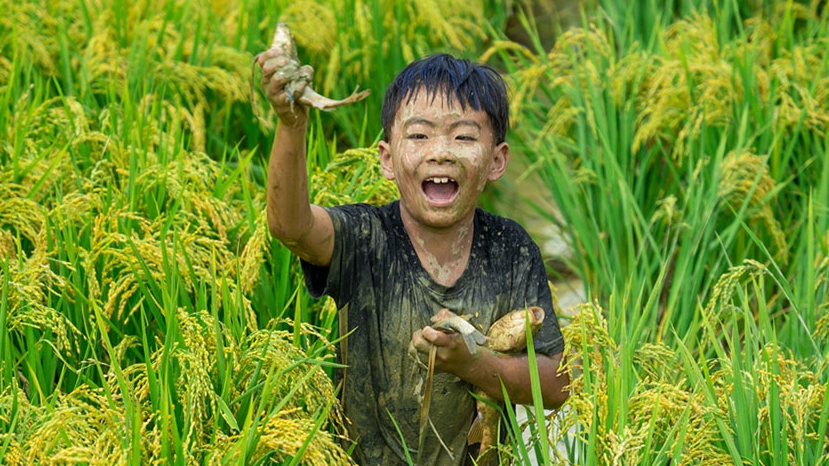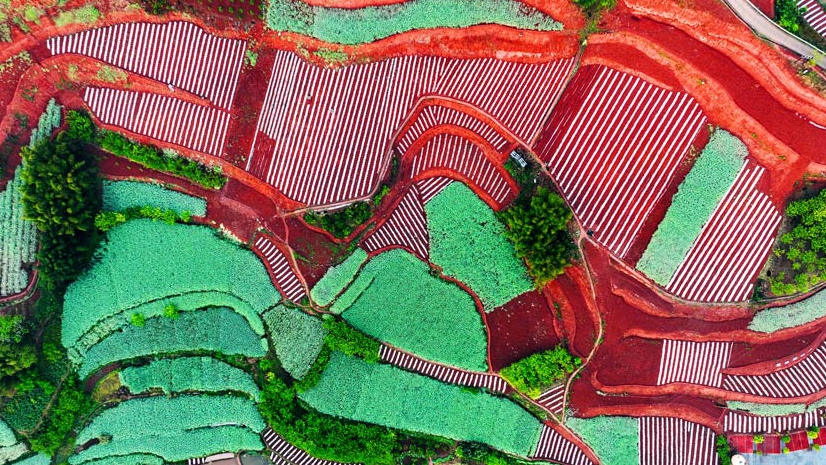Across China: Migrant women's life sweetened by wine industry in northwest China
YINCHUAN, Sept. 11 (Xinhua) -- When Su Jinping moved to Xixia District in Yinchuan, capital of northwest China's Ningxia Hui Autonomous Region, 20 years ago, she saw a vast grey land full of sand and stones hostile to human habitation and agriculture.
The 50-year-old woman, originally from the neighboring Gansu Province, has been working for 20 years at a winery in the district.
Su has harvested sweetness with thousands of other migrant women working in over 110 wineries in Ningxia.
"We began building a vineyard when I first came here, but the grape seedlings were only two centimeters high and could die any time on bad soil," she said.
Now, Su earns about 3,000 yuan (about 434.2 U.S. dollars) per month from the winery, besides extra earnings from her field.
With relentless ecological protection and restoration efforts by the local government, vineyards and wineries have mushroomed in the eastern foothills of Helan Mountain, which have become a green corridor from dry sandy land over the past decade.
"Wine, in the color purple, is not only a dream of a better life but also better ecology," said Liang Yanshun, Party chief of the Ningxia Hui Autonomous Region.
Yuanshi Vineyard, where Wang Caixia works, is one of the wineries developed over the past decade in Ningxia. Built on the site of an old quarry, it employs some 200 workers, two-thirds of whom are migrant women around 50.
"We cleaned up the old quarry ground and turned it into a vineyard with the help of the local government. The stones we collected were used to build a purely stone winery with typical Chinese architectural style," said Yuan Yuan, the owner of the winery.
Like Su, Wang is a migrant farmer from northwest China's Shaanxi Province and has been picking grapes for 18 years at the vineyard.
Regarded as an expert in grape growing and picking, the 53-year-old knows the best time for watering the grapes to make them sweet and tasty.
"Our winery depends on these experienced staff to produce good quality wines," Yuan said.
Xu Hongjuan, 48, has worked as a wine fermenting worker for 16 years at the winery. She used to be a migrant worker before Yuan hired her.
"The winery has given my family much help. When one of my family members was sick, it provided me with financial support," Xu said.
With the development of the wine industry, Ningxia has created 130,000 jobs for local farmers, many of whom are migrant women like Su, Wang, and Xu.
"The small grapes have contributed to people's livelihood by boosting their income. At Ningxia's main resettlement area for migrants, the eastern foothills of Helan Mountain are home to 1.23 million migrants," Liang, the Party chief, said.
According to Liang, one-third of the income of migrants, which stands at 1 billion yuan, comes from the wine industry, enabling them to become better off.
Photos
Related Stories
- The migrant worker with an audience of millions
- Special train helps migrant workers in Guizhou return to work
- China to promote vocational training of migrant workers
- Beijing provides grants for migrant workers who stay put over holiday
- China sees remarkable achievements in poverty alleviation through boosting employment
- China to strengthen legal aid for migrant workers
- China to strengthen judgment enforcement in unpaid wages for migrant workers
- China's rural migrant workers become more proactive in choosing jobs
- Migrant workers leaving megacities in search of more stable lives in third- and fourth- tier cities.
- Livestreaming lures migrant workers back to farms with the potential for higher incomes
Copyright © 2022 People's Daily Online. All Rights Reserved.









